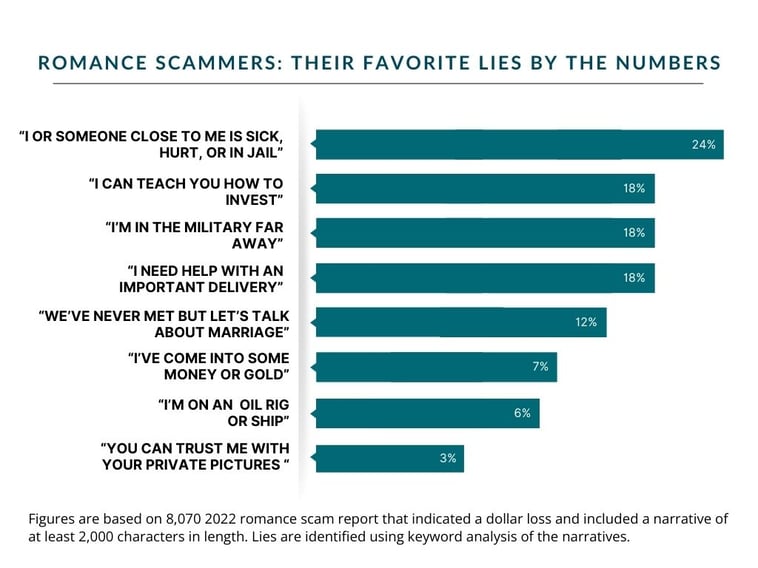What Is a Romance Scam?

fraud awareness series
Imagine you're scrolling through your social media or dating app and suddenly, a message pops up. It's from an intriguing stranger who seems to tick all the boxes of your dream partner. Exciting, isn't it?

In our digital age, it's perfectly normal to strike up connections with people we've yet to meet in person. But what if this seemingly perfect stranger is actually hiding a sinister secret? What if their charm and charisma are just tools used to deceive you? Unfortunately, this scenario isn't just a hypothetical - it's the harsh reality of romance scams.
here's what we'll cover
|
|
 what is a romance scam?
what is a romance scam?
Romance scams are fraudulent schemes where con artists pretend to be interested in a romantic relationship, only to exploit unsuspecting victims for financial gain. According to the Federal Trade Commission (FTC), these scams led to an alarming loss of $1.3 billion in 2022. That year, 70,000 people reported a romance scam, and the median reported loss was a staggering $4,400.
payment method typically used
Scammers are mainly interested in one thing - taking your money. They cleverly disguise their intentions behind a romantic relationship, inventing detailed stories to pull you in, all with the goal of taking advantage of your finances. They often ask for payments through methods like wire transfers, gift cards, and surprisingly, even cryptocurrencies.
QUICK TIP: Watch out for potential scammers posing as successful cryptocurrency investors. They may offer to teach you how to invest, but any "investment" you send them will only end up in their own wallet. Stay cautious, and do not send any form of payment. |
Here's a report from the FTC showing the many payment methods used in romance scams.
 what are common examples of romance scams?
what are common examples of romance scams?
The Overseas Lover:
In this scenario, the scammer typically creates an attractive profile on a dating site or social media platform. They might claim to be a successful businessperson or military personnel stationed abroad. As they build a connection with you, they express a strong desire to meet you in person but cite financial constraints as the reason they can't.
They might say something like, "I can't wait to see you, but my business has hit a rough patch and I don't have the funds for a ticket," or "I'm stationed overseas and need money to get my leave approved so we can finally meet."
They prey on your emotions, banking on the fact that you'll want to help your new love interest.
The Medical Emergency:
In this scenario, the scammer might have been communicating with you for a while, perhaps even building a seemingly strong emotional bond. Suddenly, they claim a health crisis has arisen - either for themselves or for a close family member.
They might share a story like, "My mother has been diagnosed with a serious illness and we can't afford the medical bills," or "I've had an unexpected accident and I'm stuck with hefty hospital bills."
They appeal to your sympathy, hoping that you'll offer financial assistance in their time of need.
The Investment Opportunity:
This type of scam usually involves a scammer who claims to have a profitable business idea or investment opportunity. They might present themselves as an entrepreneur or investor with a golden opportunity that could make both of you wealthy.
Their pitch might sound something like, "I've got this incredible business opportunity, but I'm a little short on cash. If you could invest some money, we could both reap the profits," or "I have insider information about a promising startup, but I need more funding to buy shares. Can you help?"
They bank on your desire for financial gain, hoping that the promise of high returns will entice you to part with your money.
In each of these scenarios, the common thread is a request for money from the victim. The scammer manipulates emotions and exploits trust, all with the goal of financial gain. Remember, genuine relationships are built on mutual respect and honesty, not financial transactions.
QUICK TIP: Be careful of the information you share online because that's what scammers look at to craft their deceitful narratives. |
 how to outsmart a romance scammer
how to outsmart a romance scammer
Arm yourself with knowledge and vigilance to outsmart potential scammers:
- Verify their identity: Scammers often use stolen photos and rehearsed stories. Use online resources like Google's reverse image search to check if their photos appear elsewhere on the internet. If they're telling you an elaborate tale about their life, try searching for details online. Does their job history match up with what's on LinkedIn? Is there a news article about that heroic act they mentioned?
- Never send money: Scammers are experts at evoking sympathy and creating urgency. They might weave a heart-wrenching story about being stranded overseas and needing funds to get back home, or perhaps they'll tell you about a sudden personal crisis that requires immediate financial assistance. No matter how compelling they seem, never send money, gifts, or any form of financial aid to someone you've only met online.
- Report suspicious activity: If you notice any suspicious behavior, report it immediately to the platform you're using and to the Federal Trade Commission (FTC). Even if you're not entirely sure, it's better to be safe than sorry.
Trigger words to watch out for
Scammers often use certain phrases to manipulate their victims emotionally. Stay alert to these commonly used lines:
- "I've fallen for you quickly." Scammers often profess love quickly to gain your trust.
- "I'm overseas and need funds to get back home." This is a classic scenario where they create a sense of urgency to prompt you to send money.
- "I have a lucrative business opportunity for us." This is another tactic where they allure you with the promise of a profitable venture, but it requires your financial contribution.
Here's a report from the FTC sharing popular lies scammers told in a romance scam.

QUICK TIP: Beware of romance scammers who may persuade you to share explicit photos and then use them for sextortion, threatening to expose these images to your social media contacts. |
what's next?
When it comes to online interactions, remember that real love is founded on trust and honesty. To ensure your safety, here are some important things to keep in mind:
- Stay vigilant: Be aware of any suspicious activity or red flags in your online interactions.
- Report suspicious activity: If you encounter any suspicious behavior or believe you may be a victim of a romance scam, report it immediately to the appropriate authorities or the platform you are using.
- Protect your personal information: Avoid sharing sensitive personal information online, such as your address, financial details, or passwords.
- Trust your instincts: If something feels off or too good to be true, trust your gut instinct and proceed with caution.
As the Content Specialist and author of the Learning & Guidance Center, Yanna enjoys motivating others by uncovering all that's possible in the world of finance. From financial tips and tricks to ultimate guides and comparison charts, she is obsessed with finding ways to help readers excel in their journey towards financial freedom.
more resources for your financial journey
HOW TO KEEP YOUR MONEY SAFE FROM ONLINE SCAMMERS
Can you tell if you’re being scammed? Here's how you can protect your money online with tips on online safety, how to identify a scam, and more.
7 min. read
HOW TO PROTECT YOURSELF FROM FRAUD
Don't become a victim of fraud. Learn how to protect yourself and your finances with these helpful tips.
13 min. read





.png)